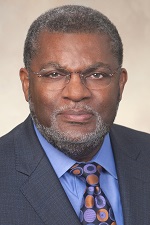 Jackson, Miss., skyline. (Source: Shutterstock)
Jackson, Miss., skyline. (Source: Shutterstock)
With government failing to help the poor and minorities, credit unions need to press corporations to invest more and government to do more for these communities, Hope Credit Union CEO Bill Bynum said during the opening session of Inclusiv's annual meeting.
Inclusiv, which was renamed from the National Federation of Community Development Credit Unions in October 2018, held this year's meeting online.
Recommended For You
Hope Federal Credit Union of Jackson, Miss. ($352.3 million in assets, 36,432 members) was founded by Bynum in 1995, and is a low-income-designated Community Development Financial Institution. It has 30 branches serving low-income and minority populations in Mississippi, Alabama, Louisiana, Arkansas and Tennessee.
"The people we serve have long experienced extraordinary fragility, high levels of economic distress, poor health conditions, worse education outcomes and economic uncertainty just by virtue of what they look like, where they were born, their race, their gender, their preferences," Bynum said.
 Bill Bynum
Bill Bynum "There's a lack of a safety net, wealth-, health-gaps. All of these conditions have been exposed and exacerbated by the triple whammy we're facing — not just the health crisis, but the unprecedented economic and racial justice crises.
"Where do people go? It should be our government. Unfortunately, it has been so evident that the federal responses were not designed for the people and communities we serve," he said.
Bynum cited the Paycheck Protection Program, which was designed to support small businesses, but in the first round "shut out 90% of all Black and brown businesses that are mom-and-pop or sole proprietor."
When funds were earmarked for distribution by CDFIs, Hope, which normally makes 40 to 50 business loans per year, was able to originate nearly 3,000 PPP loans.
"It was an incredible lift for my colleagues, but that's what [community development credit unions] do. We step up on behalf of our community, organize our assets and apply them in the best way we can," he said.
Hope continues to look for ways to help immigrants and others not reached by pandemic-related relief. "We were able to raise some resources, and provide some bridge resources to people just to get food and keep a roof over their heads."
Part of the CARES Act forged by Congress and enacted March 27 sent money to states to be set aside for local governments to buy personal protective equipment and other necessary expenses to assist the public during the COVID-19 pandemic.
However, in Alabama, Mississippi and Louisiana, cities and counties first had to spend the money, and then seek reimbursement from their state. The practice systematically made the funds hardest to obtain in the poorest counties, where local governments are cash-strapped and can't afford to spend money on materials that — if all worked well — would be repaid by their states down the road.
One of those towns was Selma, which Bynum described as "the poorest town in Alabama." The town lacked the upfront money for personal protective equipment, air-conditioning system upgrades and salaries for first-responders.
Hope set up a bridge financing program "so they could get their own tax money and get reimbursed for it. That's what we're up against, and unfortunately what we're doing is just a finger in the dike."
However, Bynum said there are some encouraging signs.
When Netflix pledged $100 million to support Black communities in June, $10 million of the total was given to Hope Credit Union to "fuel economic opportunity in underserved communities across the Deep South."
Earlier this month, the Business Roundtable announced policies to improve racial equity, including initiatives to support Black-owned businesses and to promote programs to reach the underbanked,
"In almost 40 years of doing this work, I can't remember a time when there's been this much discussion around diversity, equity and inclusion, or acknowledgement of the systemic barriers to opportunity and racial justice," Bynum said.
Yet Bynum said years of progress from the Community Reinvestment Act, the Fair Housing Act and consumer protections are under siege, and credit unions need to speak out to protect them.
"We are just a rounding error in the resources that are needed to get our communities to where they need to be," he said. "We need to ally ourselves with other CDFIs, faith-based organizations, advocates for the poor and people of color, and stand up for policies and laws that support our members and communities.
"We are the ones carrying the baton of the civil rights movement," he said. "We have got to continue to protect voting rights, but we also got to carry forth that baton to do what Dr. King said, to move to economic rights for those who are most vulnerable.
"Nobody's better equipped to do that than credit unions."
© Touchpoint Markets, All Rights Reserved. Request academic re-use from www.copyright.com. All other uses, submit a request to [email protected]. For more inforrmation visit Asset & Logo Licensing.







